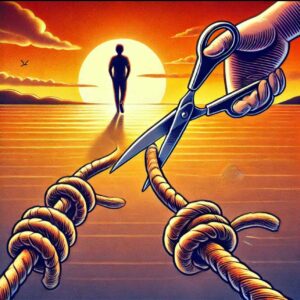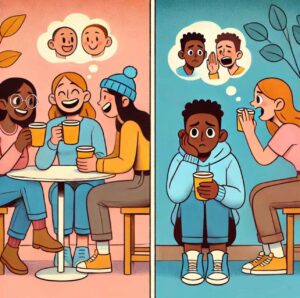Welcome Blessings!
(Tap 🔽 to see more topics!)


Understanding how to spot toxic people is a crucial part of life. It’s that familiar feeling after an interaction, a sense of unease, a weight that lingers even when nothing dramatic happens. Like your energy has been subtly siphoned away, this is a common experience and, often, a clear indication you’ve encountered a toxic individual. We know that healthy connections are vital and the foundation for happiness and support. Yet, sometimes, these connections become harmful. Trust erodes as people we once relied on begin to undermine our self-worth, distort our perceptions, or exploit our kindness.
It isn’t about occasional disagreements or fleeting bad moods. But, it is also about consistently dealing with individuals who drain your energy, take advantage of your kindness, manipulate your emotions, and compromise your well-being. Recognizing these patterns is the first step towards self-preservation. If you’ve ever needed to identify these ‘energy drainers’ and, more importantly, learn how to protect yourself, you’re in the right place. In today’s article, you will learn the signs of toxic behavior, provide practical strategies to safeguard your peace, and explore how to cultivate healthier relationships.
Note: The narratives presented in this article are based on actual events. For confidentiality reasons, the individuals’ names have been modified.
Eraya always worked hard and showed generosity. She gave her all to her craft and trusted those around her, believing in their promises. But little did she know that some of the people she trusted the most would betray that trust in ways she never could have imagined.
It all began with her Uncle Devi, a man she had always admired. He always claimed to care about Eraya’s success, so when she finished writing a book — a project that took years of late nights, sacrifice, and hard work (to the point that she even took aside her doctoral studies to finish writing the book)— she eagerly shared it with him. Uncle Devi promised that once his name appeared on the book, he would help her with publication. Eraya believed his words and trusted him completely. She even included his name in the manuscript (even without him helping with the writing), believing the gesture would allow them to share her achievement.
She worked tirelessly on the book, pouring her soul into every page, and when the manuscript was finally ready, she handed it to him. But after that, everything changed. Weeks passed, then months, and Uncle Devi didn’t update her once. Her polite follow-up messages received no response. She couldn’t understand it — how could he ignore her like this, especially after everything she had done?
Despite Eraya promptly repaying the loan he lent; money she did not use personally and she’d generously passed on to someone in need- the book felt like an undeclared form of interest, a silent agreement she hadn’t consented to. It seemed he had no intention of helping her or fulfilling his promise. Instead, it felt like he took advantage of her trust. She worked so hard and placed her faith in him, and in the end, it felt like he stole her work and disregarded the effort she poured into it.
But Eraya’s disappointment didn’t end there. Her trust suffered further betrayal from Devi’s sister, Dally. While Eraya was abroad for work, she left some of her belongings at Dally’s house. She trusted Dally to look after her things, knowing they would be safe until she returned. But when Eraya returned to collect them, Dally casually mentioned that she had already used them. Without asking for permission and without considering Eraya’s feelings, she took things that held deep sentimental value to Eraya.
They weren’t just kitchen tools or cooking supplies; they were items Eraya bought with her late aunt, someone she held close to her heart. To Dally, it seemed like no big deal — she promised to replace them. But for Eraya, it was the disrespect that hurt the most. Dally didn’t even bother to ask if she could use anything. It wasn’t just about the items but about the lack of respect for Eraya’s boundaries, possessions, and memories.
Eraya had always been careful with other people’s belongings. Whenever she stayed at someone’s house, she made sure not to use anything without permission. She never took advantage of anyone’s kindness or generosity. So when Dally didn’t offer the courtesy of asking, Eraya couldn’t help but feel slighted. She didn’t want to escalate the situation, but the hurt was undeniable. It wasn’t just about the items but the lack of empathy and understanding. How could Dally not see the sentimental value of those things? How could she treat them as if they were insignificant?
As Eraya reflected on these experiences, she couldn’t help but wonder: Did Devi and Dally learn this behavior? Was it a result of how they were raised? Or did they lack respect for others? Eraya had always been considerate of people’s feelings, boundaries, and possessions. She went out of her way to help and be kind, yet others took her gestures for granted and betrayed her trust.
She realized that sometimes, the people we trust the most hurt us the deepest. It is a painful lesson, but it teaches us the importance of being careful with our trust, time, and efforts.

From the story of Eraya and her experiences with her uncle, Devi, and his sister, Dally, we can see the signs of toxic people that we should be aware of. These behaviors are subtle but harmful, and recognizing them can help us protect ourselves from emotional and mental strain.
1. Broken Promises and Unkept Agreements. Toxic people often make promises they have no intention of keeping. In Eraya’s case, her uncle, Devi, promised to help her with the publication of her book once his name was on it. She trusted him, worked hard, and sacrificed her time and her research, but Devi went silent after handing him the manuscript. The uncle didn’t update her, and there were no follow-ups or communication.
Despite repeated attempts to follow up, she even visited him in person (when she had a short vacation in their home country). She brought presents for him and his family, but her trust and effort were ignored, leaving her to wonder if he had ever meant to help in the first place. This behavior — promising something and then not following through — is a classic trait of a toxic person.
2. Manipulation Through Silence and Avoidance. Another sign of a toxic person is their tendency to manipulate situations by avoiding direct communication. Instead of addressing the problem, poisonous individuals will often withdraw or remain silent, leaving others hanging. Devi’s complete lack of response to Eraya’s polite follow-up messages is a form of emotional manipulation. By not updating her, he forced Eraya to feel uncertain and anxious, and eventually, her uncle betrayed her. It is a common tactic used by toxic individuals to avoid responsibility while reaping the benefits of others’ hard work and trust.
3. Disrespect of Boundaries. Toxic people often have little regard for other people’s boundaries. They feel entitled to take what they want without asking for permission or considering how their actions affect others. Dally’s behavior illustrates this perfectly. Eraya had left her belongings with her, trusting her to keep them safe. However, Dally used Eraya’s items without asking, offering to replace them later. The real issue wasn’t the replacement — it was the complete disregard for Eraya’s boundaries and the fact that Dally didn’t feel the need to ask before using things that weren’t hers. This lack of respect for personal space and belongings is a clear sign of toxic behavior.
4. Lack of Empathy for Others’ Feelings. These kinds of people often lack empathy, especially when it comes to understanding the emotions of others. In Eraya’s case, Dally’s actions were not just disrespectful; they showed a lack of empathy. Eraya had bought the items with her late aunt, who was very dear to her. To Dally, these items may have been just “things,” but to Eraya, they held sentimental value. Dally didn’t seem to care about the emotional significance attached to the items, demonstrating how toxic people fail to consider the feelings of others.
5. Lack of Accountability and Responsibility. A toxic person rarely takes responsibility for their actions. Instead, they shift blame, avoid confrontation, or disappear when faced with the consequences of their behavior. This was the case with Devi, who ignored Eraya’s follow-up attempts and failed to take any responsibility for his unfulfilled promise. By disappearing and leaving Eraya hanging, he showed that he wasn’t accountable for his actions or their impact on her.
6. Taking Advantage of Trust and Vulnerability Toxic people often prey on others’ trust and vulnerability, knowing they can use it for their benefit. Eraya trusted her uncle and his sister, believing they would honor her requests and respect her belongings. Instead, they both took advantage of her trust—Devi by taking credit for her hard work and Dally by using her personal belongings without permission. This kind of exploitation of vulnerability is one of the most painful aspects of toxic relationships.
As we can see from Eraya’s story, toxic people can manifest in many ways, from unkept promises to exploiting kindness. Recognizing these signs can help you protect yourself from emotional harm. Trust your instincts, set clear boundaries, and don’t be afraid to walk away from relationships that drain you or make you feel disrespected.
By understanding these toxic behaviors, you can learn to handle situations like Eraya’s with more clarity and strength. It’s important to remember that your trust, time, and effort are valuable—and you deserve to have them respected, not taken advantage of.
Eraya had always believed in the value of genuine friendship — the kind where support flowed both ways. She valued loyalty and empathy, offering help whenever possible, even when her circumstances were challenging. However, a painful experience with her friend Shyamal made her question the sincerity of those she trusted.
Eraya had stopped working due to health issues, and her finances had become strained. Despite her struggles, she didn’t hesitate to help a former colleague who was facing a heartbreaking situation — his sister’s battle with cancer. She reached into her limited savings and sent what she could, hoping to ease some of his burden. In a moment of vulnerability, she shared this with Shyamal to gently explain why she couldn’t afford to buy the items Shyamal was selling.
But what Eraya didn’t expect was how Shyamal responded. Soon after, Shyamal began sharing her financial troubles — her father’s hospitalization, the weight of the medical bills, and the stress pressing down on her. Eraya empathized deeply, listening attentively and offering heartfelt prayers and genuine concern. She even went so far as to reach out to a well-known actor, hoping he could provide some assistance — a gesture no one had done for her when she was in need. Additionally, she shared charity links and organizations that help cover hospitalization bills, making every effort to support her friend without overstepping boundaries.
Shyamal never explicitly asked Eraya for money, but the undertones were clear. It felt as though she expected Eraya to lend her money, assuming that Eraya could ask her husband for help. However, Eraya had always been careful not to burden her husband with her problems, let alone someone else’s. She didn’t want to strain her relationship by placing the weight of another’s needs on his shoulders.
After Eraya had extended her help (not in monetary form), Shyamal communication began to dwindle. Days turned into weeks, then months. Eraya had asked how Shyamal was doing, and her father was faring, but her messages went unanswered. Eventually, Eraya decided to respect Shyamal silence, assuming her friend needed space. So, Eraya turned off her notifications to focus on her studies, choosing not to dwell on the one-sided nature of their friendship.
Months later, out of the blue, Shyamal reached out to Eraya, accusing her of having changed. She pointed out that Eraya hadn’t responded quickly to her email, implying that Eraya had distanced herself deliberately. Eraya was stunned. Shyamal had gone silent first, ignoring her efforts to stay in touch. How was it now Eraya’s fault that they had grown distant?
The realization hit Eraya hard. Shyamal hadn’t considered her silence and her lack of response to Eraya’s genuine concern. Instead, she blamed Eraya, expecting her to be readily available whenever she reached out. It became painfully clear that Shyamal saw Eraya’s support as a given, a convenience to be leaned on only when it suited her.
Eraya took a deep breath and calmly explained that she had respected Shyamal’s silence, believing she needed space. She shared how she tried to stay in touch but had chosen to step back when her efforts were unanswered. At that moment, Eraya realized that not all friendships are rooted in mutual respect. Some are sustained by convenience. A fact she couldn’t ignore any longer.
Moving forward, Eraya knew she had to protect her peace, even if it meant letting go of relationships that only took without giving. This problematic lesson reinforced her resolve to value her worth and set healthy boundaries.

From the story of Eraya and Shyamal, we can see the following signs of toxic people that we should be aware of:
7. Victim Mentality. In the story, Eraya opened up about her difficulties, sharing her sacrifice to help someone in need, that is why she can’t buy what her friend is selling. Instead of acknowledging Eraya’s struggles, Shyamal quickly shifted the focus to her problems. Subtly expecting Eraya offered financial assistance ignoring Eraya’s health problem, which is why she quit her job. Toxic people often minimize others’ struggles while magnifying their own.
8. Playing the Guilt Card. Shyamal never directly asked Eraya for money, but her conversations were laced with implications that Eraya should help. The idea that Eraya could “just ask her husband” shows a disregard for Eraya’s boundaries. Toxic people often use guilt to pressure others into doing what they want without having to take accountability.
9. Abandon you when you’re of no use to them. After Eraya went out of her way to help Shyamal by contacting a popular actor (without a response where Eraya felt so embarrassed) and offering online resources, and prayers, Shyamal suddenly stopped responding to her messages. This withdrawal revealed that Shyamal’s interaction was likely based on her need rather than genuine friendship. Toxic people tend to disappear when they no longer need your help or they do not get what they want from you.
10. Blame Shifting. When Shyamal finally reached out after months of silence, she accused Eraya of having “change”, like “this is so unlikely of you!” for not immediately responding to her email. This blame-shifting disregarded the fact that Shyamal had been the one who ignored Eraya’s last attempts to reach out. Toxic individuals often deflect responsibility for their behavior and make you feel like the problem.
11. They expect access to you on their terms. Shyamal assumed that Eraya should be available whenever she reached out, regardless of Eraya’s boundaries or reasons for not immediately responding. Toxic people often feel entitled to your time and attention without considering your circumstances.
Recognizing these signs can help protect ourselves from people who drain our energy and compromise our peace of mind. Building healthier relationships means surrounding ourselves with those who genuinely value mutual respect and understanding.
Eraya chooses to protect her peace by remaining silent after learning of Uncle Devi and Dally’s betrayals. Instead of confronting them, she prays and trusts that God is watching over her. With Shyamal, she maintains the friendship but creates boundaries to safeguard her emotional well-being. Eraya doesn’t cut ties but recognizes the need to distance herself from people who repeatedly take advantage of her.
If you find yourself in similar situations, consider these practical tips to protect yourself from toxic people:
Ultimately, maintaining healthy relationships requires mutual respect and effort. Protecting your peace is not selfish — it’s necessary for your well-being. Like Eraya, choose to guard your heart while remaining compassionate and kind.

Dealing with toxic people, whether they’re friends, relatives, family, or anyone else, is challenging. It can leave you questioning yourself, feeling drained, and sometimes even blaming yourself. But remember, you’re not to blame. You did what you thought was best then, and that’s okay. Now, it’s time to focus on healing.
Give yourself a break. Let go of the ‘what ifs’ and the ‘should haves.’ If you can, let go of any anger or bitterness you might be holding onto. It won’t erase what happened, but it will lighten your load.
Now, it’s your turn. Focus on what makes you happy. Do the hobbies you’ve been neglecting, spend time with people who lift you, and remember that you deserve to feel good. And yes, creating space for new, healthy relationships is okay. Find your tribe, people who share your values and make you feel seen and heard.
Most importantly, remind yourself that you deserve love, respect, and happiness. You have the power to choose who you want in your life. You get to decide who gets to be a part of your story. You’ve learned to spot the red flags, set boundaries, and care for yourself. Now, you’ve taken a big step towards building a healthier, happier life.
What’s your next step? Share your thoughts in the comments below – what resonated most? And if you know someone who could benefit from this, share it with them. Don’t forget to explore our other articles for more tips on building a positive and fulfilling life. Voila! Until next time!